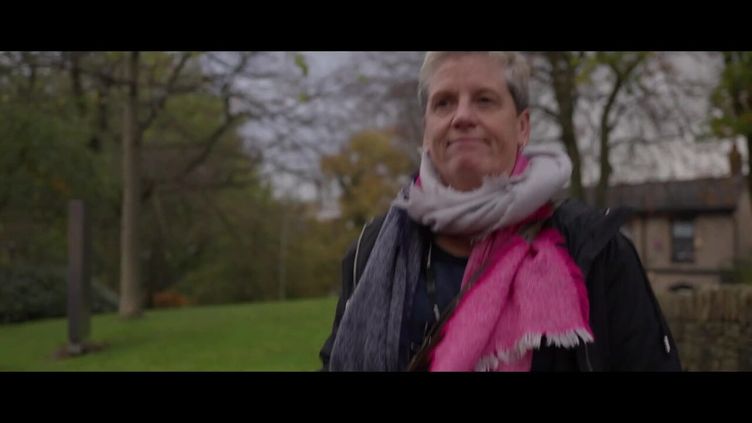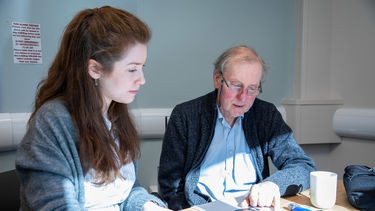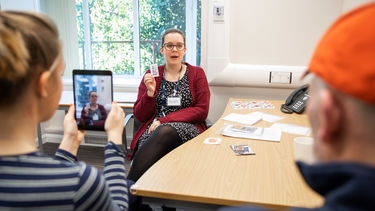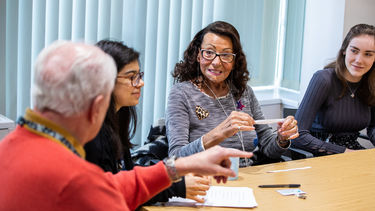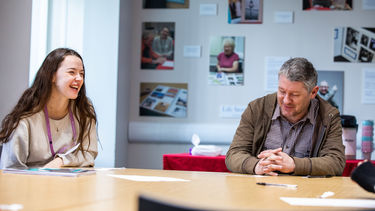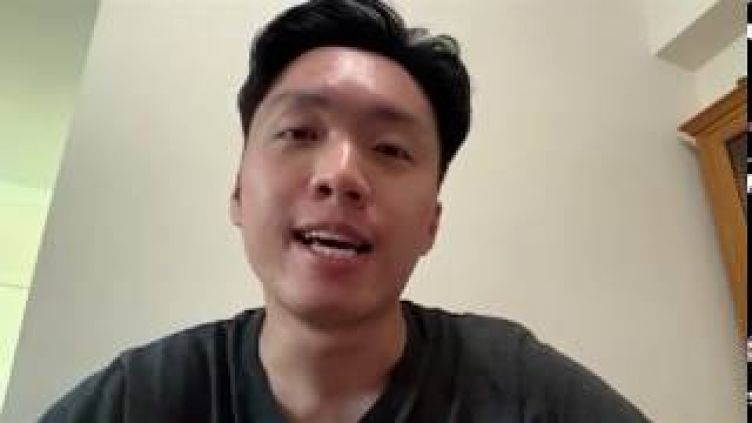Speech and Language Therapy BMedSci
Our accredited speech and language therapy course combines clinical practice and theoretical knowledge with case-based learning, preparing you for a rewarding career supporting people with communication or swallowing difficulties.
-
A Levels
AAB -
UCAS code
B621 -
Duration
3 years -
Start date
September
- Accredited
- Course fee
- Funding available
- Clinical placement
- FY Foundation year entry for mature students
Explore this course:
This course is no longer taking applications for 2026-27 entry. View 2027-28 entry or find another undergraduate course.
Course description
Why study this course?
Top 10 in the UK for speech and language therapy
The Complete University Guide has ranked Sheffield one of the top universities in the UK for speech and language therapy for the last three years (2024, 2025, 2026).
Get hands-on in our speech and language therapy clinic
You’ll build up your practical skills and experience in our on campus speech and language therapy clinic, working directly with people with communication difficulties.
Learning beyond the lecture theatre
Put your knowledge into practice on a diverse range of placements, including schools, specialist clinics and hospital wards.
£5,000+ annual NHS training grant
NHS training grants are available for all eligible UK home students to help you with your studies, as well as funding to cover the cost of placements.

Study at Sheffield and gain the expertise and confidence you need to deliver life-changing care as a qualified speech and language therapist.
This three-year programme is designed and delivered by experienced speech and language therapists, clinicians and researchers, who are committed to your wellbeing and success.
You will learn how to assess, diagnose and support children and adults with a range of communication, or eating, drinking and swallowing difficulties.
Study topics include linguistics, psychology and speech pathology, and the medical knowledge that supports these areas. You’ll also explore how sociology and social psychology impact therapy. As your understanding grows, you’ll discover how therapists can support a range of needs, including aphasia, learning disabilities, speech sounds disorders or dysphagia (swallowing difficulties).
The skills you gain at Sheffield will provide you with an excellent foundation to specialise in your future practice and provide evidence-based care.
Accreditation
This course is approved and accredited by the Health and Care Professions Council (HCPC) and the Royal College of Speech and Language Therapists (RCSLT).
Our curriculum is informed by the QAA benchmarks for speech and language therapy, the RCSLT curriculum guidelines and the HCPC standards of proficiency and standards of education and training for speech and language therapists.
Speech and language therapy with a foundation year and apprenticeships
Speech and language therapy with a foundation year
If you are a mature student without standard entry qualifications you can study this course with a foundation year, which will prepare you for degree-level study.
Speech and language therapy apprenticeship
We also offer a four-year speech and language therapy degree apprenticeship. Apprenticeship places are advertised locally in partnership organisations (such as NHS jobs), and combine work-based learning with online study.
Modules
There may be changes before you begin your studies. As you progress through your course, we’ll confirm additional details of what you will study.
UCAS code: B621
Years: 2026, 2027
Core modules:
- SLT Professional Practice 1
-
This module aims to introduce the student to the professional practice of the speech and language therapist (SLT). The module combines students' learning of theoretical knowledge of clinical methods, people with communication and eating, drinking and swallowing impairments and inter-personal and professional skills with clinical placements with children and adults with communication (and in some cases eating, drinking and swallowing) impairments. The module introduces the student to their first clinical placements with children and adult clients across placements in the Philippa Cottam Communication Clinic (PCCC) (the clinic in HCS), plus external placements in the NHS and independent sectors.
30 credits - SLT Biomedical Science
-
This module will explore components of anatomy, physiology, and neuroscience that are relevant to the understanding of human communication throughout the lifespan. This will include the respiratory, cardiovascular and nervous systems, the development, structure and function of head, and neck, and the auditory system.
20 credits - SLT Introduction to Practical Linguistics
-
This module introduces students to the practical study of linguistics -- that is, learning linguistic concepts and terminology for use in e.g., speech and language therapy, education, psychology. The module focuses on the following subfields of linguistics: phonetics, morpho-phonology, semantics, and syntax. With regard to syntax and semantics, the module emphasises relating descriptions of the structure of language to the uses/functions that language is put to, as well as how the study of typical language use can inform our understanding of language impairment. Students will also learn the practical skill of IPA (The International Phonetic Alphabet) transcription and be able to use the symbols of the IPA to produce phonemic English transcriptions as well as transcribe a range of non-English sounds.
20 credits - Participation and Society
-
This module aims to introduce students to issues related to understanding healthcare service users as individuals, and as members of society. Content includes: theoretical models of disability, psychology impact of disability across the lifespan, concepts of self and identity, concepts of quality of life and its measurement; health beliefs and behaviours, and the role of gender, race and socioeconomic position in healthcare. Students are introduced to gold standard healthcare concepts, including person-centered care and values-driven practice. Students discuss relevant models and frameworks, and apply these to case studies. Students will be encouraged to reflect on their own experiences, attitudes and interpersonal skills in the context of their impact on interactions with service users, their families and other professionals.
20 credits - SLT Speech, language, communication and literacy development in children
-
This module will cover children's development of speech, language, communication and literacy from 0 - 18 years. It addresses the following topics: speech sound/phonological development, language production and comprehension, development of pragmatic abilities, psycholinguistic models, early literacy development, the associations between speech, language and literacy, theoretical models of literacy development, understanding drivers and competing theories of how children learn language, and bilingualism. The lectures will cover developmental trajectories and 'typical' milestones across childhood. You will consider pre-lexical development, emerging language, developing language, language for learning and advanced language development. The theoretical basis of the topic will be considered from a multidisciplinary perspective, drawing from psychology, education, sociolinguistics, and linguistics.
20 credits - SLT Language cognition and communication in adults 1
-
This module introduces students to theoretical accounts of language, cognition and communication in adults. It provides conceptual frameworks and a detailed elementary coverage of the following areas: the communication chain, verbal and non-verbal communication, conversation analysis, grammar, vocabulary, multilingualism, attention, memory and executive function. It also introduces students to the impact of ageing on the above domains, and the impact of stroke, traumatic brain injury and progressive degenerative conditions on language and cognition.
10 credits
Core modules:
- SLT Developmental differences in speech, language and communication
-
This module aims to give a detailed overview of the developmental differences in children's speech, language and communication (including literacy) abilities. The module profiles these developmental differences in children and adolescents, and including learning difficulties, autism spectrum conditions and other neurodevelopmental differences. The module examines these developmental differences in the context of the diverse environments children grow up in. The impact of these developmental differences on children's lives as they grow older (eg. educational experiences, learning and well-being) are highlighted. Other perspectives are explored such as those of the parent/carers.
20 credits - SLT Key Clinical Topics 1
-
This module aims to equip students with the theoretical knowledge of a range of specific clinical topics in speech and language therapy. These topics include dysphagia, motor speech disorders, voice and neurology across child and adult populations. The themes of assessment, intervention, evidence based practice, standards of practice and clinical ethics and inter-disciplinary working will underpin these topics and enable integration across the topics.
20 credits - SLT Language cognition and communication in adults 2
-
This module builds on material covered in Language cognition and communication in adults 1 at Level 1. The module covers assessment and diagnosis of language and cognitive deficits affecting communication, which arise due to stroke, traumatic brain injury and progressive neurological conditions including dementia.
20 credits - Professional Practice 2
-
This module builds on the unit Professional Practice 1. The student completes a series of NHS clinical placements across semesters 1 and 2 including a week block placement in the student summer vacation. The placements includes: (1) the schools placement working with school-age children; (2) the conversational partners placement working with adults in the community; (3) the special needs placement working with children with severe developmental communication impairments; and (4) the adult neurological placement working with adults in acute settings. 5) one session of audiology placement. Students will complete supervised clinical work during placements and self-study activities to support their learning and clinical skills. Placements will be supported by workshops and tutorials and specific NHS induction/preparation and support.
20 credits - SLT Speech and Hearing Science
-
This module covers key concepts related to the scientific study of speech and hearing. There will be three broad areas covered within the module: articulatory phonetics, acoustic phonetics, and hearing science. The module will teach concepts relevant to the study of speech and hearing in both healthy and clinical populations.
20 credits - SLT Language Analysis: Sound and Structure
-
This module builds on the linguistic knowledge gained in Introduction to Practical Linguistics. Teaching will focus on developing students' abilities to apply phonetic observation skills to clinical data, to use advanced transcription techniques, and to use appropriate diagrams to describe the physical attributes of articulation and the role of timing in achieving articulatory targets.
10 credits
The module covers:
- Physical attributes of articulation- Using ExtIPA and diacritics- Using midsagittal diagrams- Articulatory targets and timing- Voicing and voice quality - SLT Research Methods and Statistics
-
This module is designed to introduce students to research methods and data analysis techniques through a series of lectures and small-group workshops. The aim of this module is to provide students with the opportunity to learn about and employ statistical techniques through the use of practical examples and data collection exercises. Topics covered will include (1) an introduction to research methods and the research process (2) formulating research questions and hypotheses (3) descriptive statistics and presenting data (4) samples and population distributions and (5) statistical tests (e.g., parametric and nonparametric tests; correlational analyses) (6) qualitative methods (7) principles of psychometrics (8) reliability, validity and effect sizes.
10 credits
Core modules:
- SLT Evaluating the evidence base in speech and language therapy II. Clinical dissertation
-
Evidence-based practice is the integration of high quality research evidence with clinical expertise and service user experience in making decisions about the care of patients in speech and language therapy. Building on the skills and knowledge acquired in Evaluating the evidence base in speech and language therapy I: Principles and Methods, this module will enable students to further develop and apply their knowledge of research methodology appropriate to the study of language and communication. Students will also gain an enhanced understanding of appropriate approaches to research design for evidence based practice.
30 credits - SLT Key Clinical Topics 2
-
This module aims to equip students with the theoretical knowledge of a range of specific clinical topics in speech and language therapy. These topics include a range of client groups and communication difficulties across child and adult populations. The themes of assessment, intervention, evidence based practice, standards of practice and clinical ethics and multi-disciplinary working will underpin these topics and enable integration across the topics.
30 credits - SLT Professional Practice 3
-
This module aims to consolidate the student's clinical skills and prepare the student for independent practice on graduation at the end of this third and final year. Students complete two placements as follows: a paediatric placement, and an adult placement. University workshops and tutorials will prepare and support students with their learning on placement. Assessment includes a client based presentation, written client based assignment, a video-based exam with viva assessment and two Practice Educator Reports (PER) assess their ability work independently as newly qualified practitioners. All assessments must be passed.
30 credits - SLT Evaluating the evidence base in speech and language therapy :. Principles and Methods
-
Evidence-based practice is the integration of best research evidence with clinical expertise and patient experience in making decisions about the care of individual patients in speech and language therapy. This module introduces the principles and methods of evidence-based clinical practice. Students will (1) critically evaluate the methodological quality of the research using evidence-based practice and (2) apply these conclusions to clinical practice.
20 credits - SLT Transition to Professional Autonomy
-
This module will address issues relevant to work in modern healthcare and education contexts. It addresses the following issues: Employment (job hunting, CV writing and interview skills, support mechanisms, first posts, independent practice); The healthcare context (Ethics in clinical practice, Caseload management, Clinical governance, professional competencies and professional guidelines).
10 credits
The content of our courses is reviewed annually to make sure it's up-to-date and relevant. Individual modules are occasionally updated or withdrawn. This is in response to discoveries through our world-leading research; funding changes; professional accreditation requirements; student or employer feedback; outcomes of reviews; and variations in staff or student numbers. In the event of any change we will inform students and take reasonable steps to minimise disruption.
Learning and assessment
Learning
You will learn through a combination of lectures, seminars, practical classes, and clinical placements, as well as self-directed learning.
Throughout the course you’ll be taught by knowledgeable and passionate staff - both in the classroom and on placement - who will incorporate the latest research into your teaching, so you can build an evidence base for future practice.
We are experienced in supporting students from a range of backgrounds, and we’re committed to enriching your learning experience and having a positive influence on your educational and personal journey whilst at Sheffield.
Hands-on, practical learning
Throughout the course you will learn directly from people with communication and swallowing difficulties in both health and education environments. This includes work with children and adults at our dedicated in-house Speech and Language Therapy Clinic.
Placement support is crucial to success, and you’ll get that from your practice educators, academic staff and our dedicated placement support team.
Assessment
You’ll be assessed through a combination of exams, coursework, case-based assessments and oral presentations, as well as clinical tasks such as writing up case notes or planning therapy sessions.
Your clinical skills will also be assessed during your placements.
You will also complete pre-registration eating, drinking and swallowing competency checks to make sure you have the necessary knowledge and skills to support clients with dysphagia.
Entry requirements
With Access Sheffield, you could qualify for additional consideration or an alternative offer - find out if you're eligible.
The A Level entry requirements for this course are:
AAB
- A Levels + a fourth Level 3 qualification
- ABB + B in a relevant EPQ
- International Baccalaureate
- 34
- BTEC Extended Diploma
- DDD in Applied Science (including Biomedical Science, Analytical & Forensic Science and Physical Science streams) or Health and Social Care
- BTEC Diploma
- Not accepted
- T Level
- Distinction in the Health, Healthcare Science or Science T Level, including grade A in the core component
- Scottish Highers
- AAAAB
- Welsh Baccalaureate + 2 A Levels
- B + AA
- Access to HE Diploma
- Award of the Access to HE Diploma in a healthcare-related subject, with 45 credits at Level 3, including 36 at Distinction and 9 at Merit
-
We are unable to accept transfer requests from current University of Sheffield students wishing to transfer onto this programme from other courses
The A Level entry requirements for this course are:
ABB
- A Levels + a fourth Level 3 qualification
- ABB + B in a relevant EPQ
- International Baccalaureate
- 33
- BTEC Extended Diploma
- DDD in Applied Science (including Biomedical Science, Analytical & Forensic Science and Physical Science streams) or Health and Social Care
- BTEC Diploma
- Not accepted
- T Level
- Distinction in the Health, Healthcare Science or Science T Level, including grade A in the core component
- Scottish Highers
- AAABB
- Welsh Baccalaureate + 2 A Levels
- B + AB
- Access to HE Diploma
- Award of the Access to HE Diploma in a healthcare-related subject, with 45 credits at Level 3, including 30 at Distinction and 15 at Merit
-
We are unable to accept transfer requests from current University of Sheffield students wishing to transfer onto this programme from other courses
You must demonstrate that your English is good enough for you to successfully complete your course. For this course, we require: GCSE English Language at grade 4/C; IELTS grade of 8.0 with a minimum of 7.5 in each component; or an alternative acceptable English language qualification
Equivalent English language qualifications
Visa and immigration requirements
Other qualifications | UK and EU/international
Due to the large number of applications we receive, we are unable to provide individual and specific feedback to applicants who do not receive an offer for a place on the course.
Time commitment
This is a full-time professional, pre-registration healthcare course. In-person attendance is required, and we cannot support distance or remote learning on this programme.
Healthcare programmes can be intensive and as such you should expect to have higher contact hours than other undergraduate degrees. They also may not follow the usual structure of other University programmes when it comes to semester breaks.
If you have any questions about entry requirements, please contact the school.
Graduate careers
After successfully completing your degree, you will be able to register with the Health and Care Professions Council and start practising as a speech and language therapist.
Speech and language therapists are in high demand, and there are plenty of opportunities to specialise in areas such as mental health, stammering, hearing impairment, learning disability or neurological conditions.
Many of our graduates have gone on to successful careers within NHS trusts, schools, charities, private practices or the justice system.
Later on in your career you might decide to pursue further postgraduate study and research. As a world-leading centre of research, the University of Sheffield is the ideal place to continue your academic and professional development.
School of Allied Health Professions, Pharmacy, Nursing and Midwifery
Department statistics
Top 10 in the UK for speech and language therapy
The Complete University Guide 2026

The School of Allied Health Professions, Pharmacy, Nursing and Midwifery brings together expertise from across human communication sciences, nursing, midwifery, pharmacy, and orthoptics.
We aim to train compassionate, resilient and highly skilled healthcare professionals and support them throughout their working lives.
We work closely with organisations such as the Department of Health and Social Care, the Nursing and Midwifery Council, The General Pharmaceutical Council, and the Health and Care Professions Council. This means we can offer you high-quality, research-informed courses that meet the needs of the NHS.
Study with us and join a diverse and supportive community, led by passionate teachers, clinicians and researchers who can help you fulfil your ambitions.
Speech and language therapy students will be based at our Human Communication Sciences Building, but will also have the opportunity to use our on-site Speech and Language Therapy Clinic, as well as go on placements in a diverse range of settings throughout Sheffield and the surrounding areas; including schools and hospitals.
Facilities
Our Speech and Language Therapy Clinic, which is based at our Mushroom Lane site, allows you to gain valuable practical experience on campus, alongside your clinical placements.
You’ll use the clinic’s observation and treatment rooms to work directly with children and adults who have a range of communication, eating and swallowing difficulties.
Our clinic has a range of features to support your learning, including integrated recording equipment so you can record and watch back your therapy sessions, and two-way mirrors so you can learn from other students' sessions. We also have a comprehensive stock of assessments, intervention resources and therapy equipment for you to practise using.
University rankings
A world top-100 university
QS World University Rankings 2026 (92nd)
Number one in the Russell Group (based on aggregate responses)
National Student Survey 2025
92 per cent of our research is rated as world-leading or internationally excellent
Research Excellence Framework 2021
University of the Year for Student Experience
The Times and The Sunday Times Good University Guide 2026
Number one Students' Union in the UK
Whatuni Student Choice Awards 2024, 2023, 2022, 2020, 2019, 2018, 2017
Number one for Students' Union
StudentCrowd 2025 University Awards
20th in the UK targeted by the largest number of Top 100 Employers in 2025-26
High Fliers 2026
Student profiles
Why study a degree in speech and language therapy?
Nigel tells us more about why speech and language therapy is a diverse profession, his placement at a voice clinic and the variety of voice techniques speech and language therapists use to treat muscle tension.
Fees and funding
Fees
Additional costs
The annual fee for your course includes a number of items in addition to your tuition. If an item or activity is classed as a compulsory element for your course, it will normally be included in your tuition fee. There are also other costs which you may need to consider.
Funding your study
Depending on your circumstances, you may qualify for a bursary, scholarship or loan to help fund your study and enhance your learning experience.
Use our Student Funding Calculator to work out what you’re eligible for.
Additional funding
If you are a UK (Home) student in our speech and language therapy course you can apply for the NHS Learning Support Fund to help support your studies, which you won’t need to pay back.
This includes a training grant of £5,000 per academic year, money back for clinical placement travel costs, as well as extra funding for students with dependent children or those facing hardship.
Clinical placements
The training offered on the course will be put into practice through regular clinical placements, both at the University’s in-house Speech and Language Therapy Clinic and in a variety of health and education settings. Here you’ll work closely with service users, family members, carers and related professionals to support those in your care.
Visit
University open days
We host five open days each year, usually in June, July, September, October and November. You can talk to staff and students, tour the campus and see inside the accommodation.
Online events
Join our weekly Sheffield Live online sessions to find out more about different aspects of University life.
Subject tasters
If you’re considering your post-16 options, our interactive subject tasters are for you. There are a wide range of subjects to choose from and you can attend sessions online or on campus.
Offer holder days
If you've received an offer to study with us, we'll invite you to one of our offer holder days, which take place between February and April. These open days have a strong department focus and give you the chance to really explore student life here, even if you've visited us before.
Campus tours
Our weekly guided tours show you what Sheffield has to offer - both on campus and beyond. You can extend your visit with tours of our city, accommodation or sport facilities.
Events for mature students
Mature students can apply directly to our courses. We also offer degrees with a foundation year for mature students who are returning to education. We'd love to meet you at one of our events, open days, taster workshops or other events.
Apply for this course
This course is no longer taking applications for 2026-2027 entry. View 2027-2028 entry or find another undergraduate course.The awarding body for this course is the University of Sheffield.
Recognition of professional qualifications: from 1 January 2021, in order to have any UK professional qualifications recognised for work in an EU country across a number of regulated and other professions you need to apply to the host country for recognition. Read information from the UK government and the EU Regulated Professions Database.
Any supervisors and research areas listed are indicative and may change before the start of the course.

